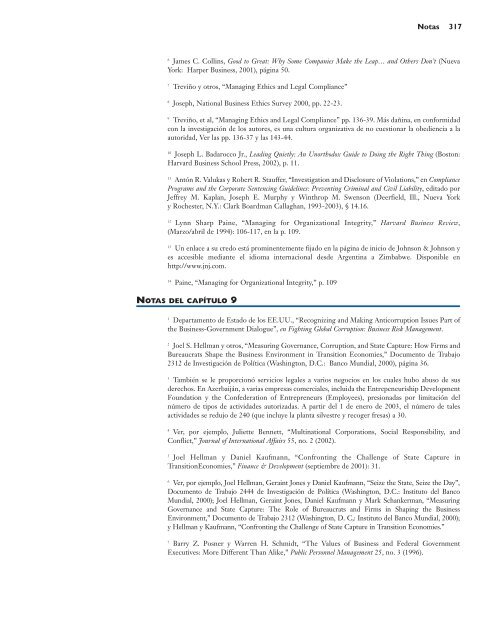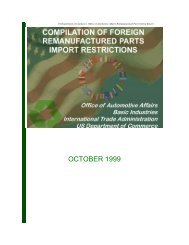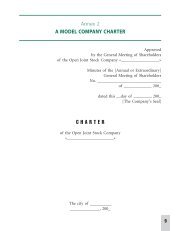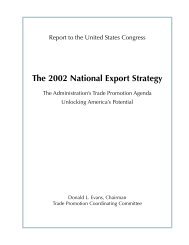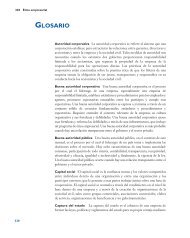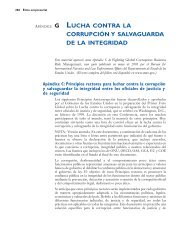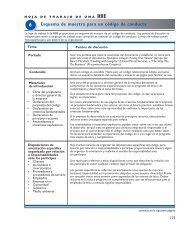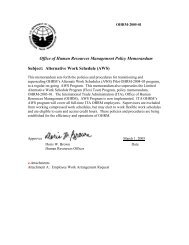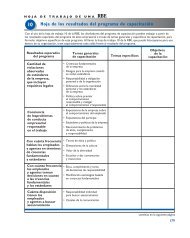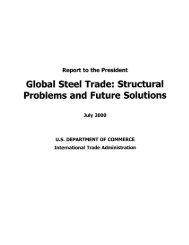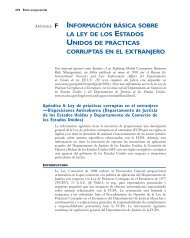Ética comercial - International Trade Administration - Department of ...
Ética comercial - International Trade Administration - Department of ...
Ética comercial - International Trade Administration - Department of ...
Create successful ePaper yourself
Turn your PDF publications into a flip-book with our unique Google optimized e-Paper software.
Notas 317<br />
6<br />
James C. Collins, Good to Great: Why Some Companies Make the Leap… and Others Don’t (Nueva<br />
York: Harper Business, 2001), página 50.<br />
7<br />
Treviño y otros, “Managing Ethics and Legal Compliance”<br />
8<br />
Joseph, National Business Ethics Survey 2000, pp. 22-23.<br />
9<br />
Treviño, et al, “Managing Ethics and Legal Compliance” pp. 136-39. Más dañina, en conformidad<br />
con la investigación de los autores, es una cultura organizativa de no cuestionar la obediencia a la<br />
autoridad, Ver las pp. 136-37 y las 143-44.<br />
10<br />
Joseph L. Badarocco Jr., Leading Quietly: An Unorthodox Guide to Doing the Right Thing (Boston:<br />
Harvard Business School Press, 2002), p. 11.<br />
11<br />
Antón R. Valukas y Robert R. Stauffer, “Investigation and Disclosure <strong>of</strong> Violations,” en Compliance<br />
Programs and the Corporate Sentencing Guidelines: Preventing Criminal and Civil Liability, editado por<br />
Jeffrey M. Kaplan, Joseph E. Murphy y Winthrop M. Swenson (Deerfield, Ill., Nueva York<br />
y Rochester, N.Y.: Clark Boardman Callaghan, 1993-2003), § 14.16.<br />
12<br />
Lynn Sharp Paine, “Managing for Organizational Integrity,” Harvard Business Review,<br />
(Marzo/abril de 1994): 106-117, en la p. 109.<br />
13<br />
Un enlace a su credo está prominentemente fijado en la página de inicio de Johnson & Johnson y<br />
es accesible mediante el idioma internacional desde Argentina a Zimbabwe. Disponible en<br />
http://www.jnj.com.<br />
14<br />
Paine, “Managing for Organizational Integrity,” p. 109<br />
NOTAS DEL CAPÍTULO 9<br />
1<br />
Departamento de Estado de los EE.UU., “Recognizing and Making Anticorruption Issues Part <strong>of</strong><br />
the Business-Government Dialogue”, en Fighting Global Corruption: Business Risk Management.<br />
2<br />
Joel S. Hellman y otros, “Measuring Governance, Corruption, and State Capture: How Firms and<br />
Bureaucrats Shape the Business Environment in Transition Economies,” Documento de Trabajo<br />
2312 de Investigación de Política (Washington, D.C.: Banco Mundial, 2000), página 36.<br />
3<br />
También se le proporcionó servicios legales a varios negocios en los cuales hubo abuso de sus<br />
derechos. En Azerbaiján, a varias empresas <strong>comercial</strong>es, incluida the Entrepeneuriship Development<br />
Foundation y the Confederation <strong>of</strong> Entrepreneurs (Employees), presionadas por limitación del<br />
número de tipos de actividades autorizadas. A partir del 1 de enero de 2003, el número de tales<br />
actividades se redujo de 240 (que incluye la planta silvestre y recoger fresas) a 30.<br />
4<br />
Ver, por ejemplo, Juliette Bennett, “Multinational Corporations, Social Responsibility, and<br />
Conflict,” Journal <strong>of</strong> <strong>International</strong> Affairs 55, no. 2 (2002).<br />
5<br />
Joel Hellman y Daniel Kaufmann, “Confronting the Challenge <strong>of</strong> State Capture in<br />
TransitionEconomies,” Finance & Development (septiembre de 2001): 31.<br />
6<br />
Ver, por ejemplo, Joel Hellman, Geraint Jones y Daniel Kaufmann, “Seize the State, Seize the Day”,<br />
Documento de Trabajo 2444 de Investigación de Política (Washington, D.C.: Instituto del Banco<br />
Mundial, 2000); Joel Hellman, Geraint Jones, Daniel Kaufmann y Mark Schankerman, “Measuring<br />
Governance and State Capture: The Role <strong>of</strong> Bureaucrats and Firms in Shaping the Business<br />
Environment,” Documento de Trabajo 2312 (Washington, D. C,: Instituto del Banco Mundial, 2000);<br />
y Hellman y Kaufmann, “Confronting the Challenge <strong>of</strong> State Capture in Transition Economies.”<br />
7<br />
Barry Z. Posner y Warren H. Schmidt, “The Values <strong>of</strong> Business and Federal Government<br />
Executives: More Different Than Alike,” Public Personnel Management 25, no. 3 (1996).


